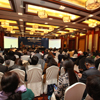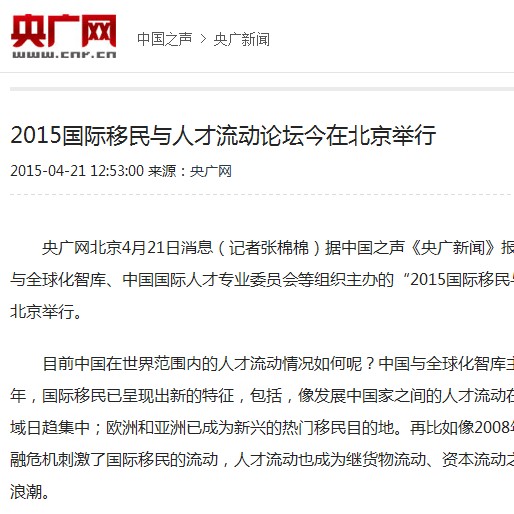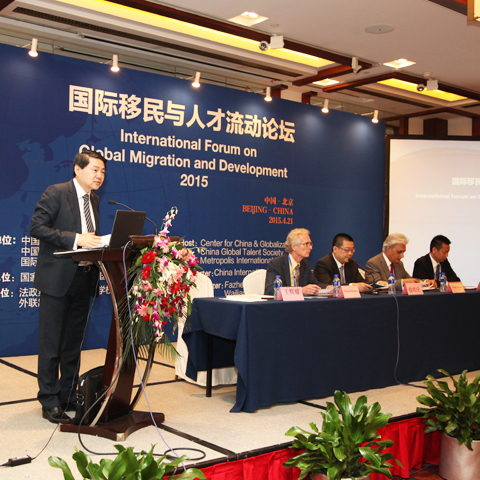- 当前位置:
- 首页>
- 活动>
- ������������
������������
CCG持续关注国际关系议题,推动中国与全球化的发展,积极开展国际交流,充分发挥智库“二轨外交”作用,在巴黎和平论坛、达沃斯世界经济论坛、慕尼黑安全会议等重要国际政策与意见交流平台上组织分论坛、边会、圆桌会议、晚宴等活动,促进国际政商学界对话,凝聚共识;CCG积极与各国政界、智库界、工商界开展“二轨外交”活动,每年常态化赴多国调研与交流,促进中外关系攸关方互动,保持与多国政策圈层的沟通渠道。
-

【央广网】中国国际人口比例仅0.06% 应加快利用国际人才红利
央广网北京4月21日消息(记者张棉棉)据中国之声《全国新闻联播》报道,中国与全球化智库主任王辉耀今天透露,目前发达国家的国际人口比例平均为10%,发展中国家平均为1.6%,而中国的国际人口比例只有0.06%,为促进中国经济转型升级,应加快利用国际人才红利的脚步。 近几年,国际移民新特征日益突出,包括“出国、归国留学生”,以及“外国来留学”等在内的国际人才,在国际间流动逐渐增多。中国与全球化智库主任王辉耀介绍,人才流动已经成为继货物流动、资本流动之后的第三次全球化浪潮。但就我国而言,还没有充分利用国际人才红利: 王辉耀:像英国、法国、德国、意大利,都不是移民国家,但是他们的国际移民水平已经都达到10%,而包括加拿大、澳大利亚在内的传统移民国家则达到20%,美国也是百分之十几,发展中国家也是2%左右,像印度是0.4%,而中国是0.06%,可见中国在利用移民红利方面还差得很远。 人社部中国人事科学研究院副院长柳学智表示,我国国民人才红利的变化与经济增长高度相关,我国国内生产总值(GDP)在2000年之后,增长势头尤为迅猛,我们的国际人才红利也从那时开始大幅增长: 柳学智:特别是出国人群和来华人群这两类人群大概都是在2000年之后开始,但是回国要晚七、八年,就是07、08年之后开始大量增长,这个很明显和经济的发展是非常吻合的,今后我估计这个趋势可能还要延续。 如何推动我国进一步利用国际人才红利?柳学智认为,首先是提供更一流的科研环境,吸引高端人才在中国做研究。第二,引导国际人才来华创业: 柳学智:在中国实施这种创新驱动发展战略的时候,我们要把这种经济转型的挑战和困难变成一种机遇,就是让大家都来创业,来推动经济转型,来推动中国经济的发展,中国经济会实现很好的超越。
2015年4月22日 -

【央广网】2015国际移民与人才流动论坛今在北京举行
央广网北京4月21日消息(记者张棉棉)据中国之声《央广新闻》报道,今天,由中国与全球化智库、中国国际人才专业委员会等组织主办的“2015国际移民与人才流动论坛”在北京举行。 目前中国在世界范围内的人才流动情况如何呢?中国与全球化智库主任王辉耀表示,近年,国际移民已呈现出新的特征,包括,像发展中国家之间的人才流动在逐渐增多;移民区域日趋集中;欧洲和亚洲已成为新兴的热门移民目的地。再比如像2008年到2009年全球金融危机刺激了国际移民的流动,人才流动也成为继货物流动、资本流动之后的第三次全球化浪潮。 中国的国际人才现状是,中国还没有充分利用国际人才红利,目前中国的国际人口比例只有0.06%,而发达国家平均的人口比例大概在10%左右,发展中国家平均在1.6%左右,也就是我们和发展中国家还差一个百分点和发达国家的话差了不止十倍。 从未来的发展趋势来说,国际移民组织驻中国联络处主任 Par Liljert 表示,从我们中国来看还是有很大发展潜力,而作为行业代表,北京法政集团董事长、总裁王广发也认为,中美两国其实在2014年亚太经济合作会议上将双方签证有效期延长到了10年,这个举措也将极大推动两国之间人才的交流互换,中国其实应该将简化的人才签证程序推行到其他发达国家,以推动中国引进更多的国际化人才。而另一位参加会议的行业代表——外联出国顾问集团董事长何梅也指出,像亚洲国家,比如说中国和印度也正在经历角色的转变,由单一的全球移民输出国,逐渐成为了移民潮的一个输出国和引进国。越来越多的留学生或者在国外工作的中国人已经回到祖国,而中国也在接受更多的外国移民,并且这个趋势会逐渐升温,这与中国为世界第二大经济体息息相关的。
2015年4月22日 -
李成:习近平让自己成为被广泛接受的领导人
专家简介李成,美国布鲁金斯学会约翰·桑顿中国中心研究主任,中国与全球化智库学术专家委员会专家。 中国现在所处的是一个非常关键的阶段。中国能否能够创造第二个奇迹——第一个奇迹是经济改革,第二个奇迹就是政治制度上的再创新。这个创新,在任何国家都要经历过很长的一段时间,包括法治建设、中国式民主建设、对整个社会的重新定义、道德观念的重建、公民社会的兴起,这些方面都是相辅相成的。 一位从未到过美国的朋友说,他”熟悉”华盛顿,因为他一直在看《纸牌屋》。华盛顿是一个大国的政治中心,但宏大并不是这座城市用来讲述政治的语境。除了白宫和国会山,这里还有无数平常的建筑,隐身期间的,是形形色色的游说团体、智囊机构、非政府组织,以及活跃的各路政治观察家。 从马萨诸塞大街走过,一不留神可能就会错过布鲁金斯学会,这个全球排名第一的智库置身于一座外观极为普通的建筑中。李成的办公室里堆满了各种中英文资料,这位新任布鲁金斯学会约翰·桑顿中国中心主任已经在美国生活了近30年,显然,他仍保持着上海人的温和、严谨和精明。在这间略显逼仄的办公室里,他注视着世界上另一个大国的政治风云。 过去的一年,李成发表了一系列有关习近平的文章,延续着他对中国领导人长期的研究与观察。在中国外交学院2015年1月发布的一项报告中,李成被列为近十年来最著名的”美国知华派专家”之一。在一个初春的下午,《中国新闻周刊》对这位资深的中国问题专家进行了专访。 中国新闻周刊:习近平成为中国最高领导人两年多来,国际社会一直对他寄予强烈的关注,国际主流媒体做过很多有关于他的报道。你在2014年的一系列研究中,梳理了以习近平为总书记的领导班子的构成。从对政治人物领导力的研究来看,习近平执政团队的形成有哪些特点? 李成:这是一个非常重要同时也很敏感的问题。从这一问题出发,我们可以观察中国政治制度的变化、未来政治走向、中国领导人作为个人的作用,以及他和中国政治结构、政治制度化之间的互动。 习近平在十八大上成为一把手以后才真正开始建立自己的领导团队。 对于习近平而言,有几个政治渊源对他很有帮助。首先,他在沿海地区福建、浙江和上海三个地方总共工作了长达22年,沿海地区的工作经历给了他很多深谙经济发展的机会。与此同时,他又有在内陆地区的资源,其中包括他在陕西家庭出身的渊源和早年插队的经历,所以他在沿海和内地之间就打通了,这种平衡是很重要的。这些因素加在一起,使他的执政具有一个比较全面、广阔的政治基础。 中国新闻周刊:从习近平作为一个政治家几十年成长的脉络来看,中共干部选拔的组织制度其实是一套庞大的体系。我们看到,一个人经历长期的磨练与筛选,最终才能够一点点脱颖而出。那么,这个体系和西方各种不同的政治体系相比较,它的合理性、效率以及风险如何?我们能否用比较超脱的眼光评判一下这个体系? 李成:我觉得这是一个值得思考的问题。首先,中国实际上建立了一个比较有效的人才选拔机制,或者说,比较合理的精英转型途径。但是,显然它还有许多方面需要完善。例如,从2012年期间发生的很多特殊事件来看,尤其是从近期反腐斗争所暴露出来的问题来看,这套机制还存在着裙带关系、派系斗争、买官卖官等种种严峻的挑战。所以需要通过反腐等整治举措,来建起一个公正、合理的机制。 当然,除了这些弊端,它仍然有很多积极的方面,而这些方面外界又不是很了解。比如,中国政治精英的轮换周期要大大快于美国国会议员的轮换,前后轮换的比率大概是20%,而中国中央委员会每五年的轮换率是65%左右,因为中国政治精英的轮换比率实际上是非常高的。 此外,中国政治制度中还有一个特点就是集体领导,这种集体领导制度的好处是权力的平衡。 在过去的二三十年,中国政治制度中形成了很多规章制度或者惯例,包括任期制、退休年龄制度、避嫌制度、地方代表性、差额选举,习近平是运用这些制度进行管理,还是在此基础上引进若干新的制度,很多方面需要他开创新的途径,同时还要在党内形成共识。近年来所发生的事情,也许会使中国的政治制度变得更成熟,对于这一点,未来这几年将会是一个考验。 中国新闻周刊:按照你的这种分析,中国的这一套政治精英选拔体系有望在现有条件下,通过逐步修正和完善而进化成一个更有效率、更公平、更有可持续性的官员产生机制。 李成:完全有这个可能。我们不要忘记基辛格博士经常讲的,中国的文明延续了两千多年,虽然它并不是世界上最古老的文明,但是它是最有延续性的一种文明,这种文明的延续必然有其道理。 中国社会文化传统当中就包括它的精英选拔、社会治理的一套体系,比如科举制,当然,这些都有弊端,但是它可以不断地演进、延伸为其他形式。目前来看,中国所处的是一个非常关键的阶段。我最近经常讲,中国是否能够创造第二个奇迹一一第一个奇迹是经济改革,第二个奇迹就是它进行的政治制度上的再创新。这个创新,在任何国家者眼经过很长的一段时间,包括法治建设、中国式民主建设、对整个社会的重新定义、道德观念的重建、公民社会的兴起,这些方面都是相辅相成的。 中国新闻周刊:你在自己的研究中提出过技术官僚在中国政治精英中的角色及演变,那么,新一代中国领导人和你多年前所描述的技术官僚群体有什么不同? 李成:这一代领导人最突出的特点就是他们中间学文科的、学法律的多了,其中有很多人不仅学过法律,而且过去的职业都在法律相关领域。无论如何,法学界人士在中国政坛的崛起,对促进法治建设会有明显的作用。 从现在的趋势来看,中国的高级官员中真正的技术官僚、工程师出身的政治家的比例将会下降。而处于上升趋势的两拨人,一是学法律的,另一部分是学金融的,此外还要加上逐渐崛起的企业家群体。所以,中国政治精英组成的改变不是一次完成的,首先它经历了从中共的草根领袖到技术官僚、自然科学人才的改变;现在则在演变为法律与金融界人士成为政治家。此外,现在多数的中国高级政治家都是从省、部级官员升上来的,那么,将来中国政治精英的产生是否会有更多元的途径?例如,包括来自智库和企业界的精英,这些途径如果能够打开的话,将更加有利于政治体制向健康、完善、更具有代表性的方向发展。 中国新闻周刊:最近一段时间有声音特别提醒要反西方化、去西方化,从西方的视角如何理解这种现象? 李成:我觉得,这些声音并不代表党内的主流,可能的确有一些偶然性的因素在起作用。实际上,这种状况的出现也不难理解,也可以说,它是中国政治多元化必经的道路。 不仅如此,以我在美国近30年的工作经历来看,在美国的学术界——从大学到智库,我从来没有接触到美国的学者(包括华人学者)认为中国应该全盘西方化。中国必然有它与西方社会不同的东西,但是许多共同的东西则有助于它真正发展成一个法治、民主、健康的国家,一个可持续发展的政治体系。 习主席最近提出要发展中国的智库,其中提到要”走出去”,与海外有更多的交流与合作,这正是要更多地去了解西方。所以,有些具有冲突性的信息的传达,实际上让我们看到,你不能简单地下结论,很多东西都是在尝试、在探索、在定位。 中国在政治、经济、社会、文化各方面的发展、它和世界的交融,究竟要走向哪个方向?当然它会受很多因素的影响,但是总体来讲,中国社会毕竟将会变得越来越成熟。中国的经济是世界经济的引擎,中国有太多的理由使自己成为一个正面的力量、发展的力量、一个崛起的大国,这一点必须要看清楚。 在这个过程中,出现问题是可以理解的。一个国家的上升不会是直线式的,它在寻找合理的政治制度或价值观的过程中,会有反复、曲折,但是海外有些观察家根据当下出现的一些现象,就认为中国会回到文革,这是不可思议的事情。 中国新闻周刊:习近平目前还处于其执政的初期阶段,国际上出现了更多的对中国问题和中国领导人的新的观察和判断,如何理解这些认识上的差异? 李成:公正地来看,在习主席最近两三年的政策当中,他做的很多事情都是在别人无法想象的情况下推出来的,不论是市场化改革、法治建设、反腐败,还是正在拟议中的对军队的改革。而在国际关系方面,他做了很多决策,并且没有走过头。所以我觉得,从目前来看,大方向的把握都是对的。 实际上,不论经过怎样的过程,一旦最终结果是好的,并且有利于制度化的建设,大家就会认同。例如,一旦法治建设摆上议事日程,在知识分子当中就会赢得更多的赞成。所以我觉得在未来两三年中,习近平会做的事情就是着眼于如何让这个在某种程度上出现意见分歧的社会,能够重新得到更多的调和与共识。要达成这一目标,在很大程度上需要确立一个更加明确的政治方向,这个方向的确立取决于当时国内的政治背景以及国际环境。 习近平作为一个强有力的领导人拥有很多政治资源,他有能力把中国带向一个政治文明的国家,留下自己的政治遗产,并且得到历史的认可。我对此抱有良好的希望。 中国新闻周刊:习近平上台以后发起的各种政治行动中,反腐可以说是受到最广泛认同的一项。反腐也提高了他的威望。 李成:我同意这个说法,但实际上也有人认为反腐”做过了”。首先,利益集团对反腐就不会认同,并且会有反弹,因而反腐也有它的危险性。还有人认为,反腐是”选择性的”,把反腐说成是斗争的工具,这是不对的。应该看到,反腐斗争的目的是为了挽救党。 王岐山显然是一个有政治抱负的人,同时也是党内的一个行动派,中共在反腐的制度性建设方面应该是有考虑的。王岐山有很多海外的朋友,他的早期经历使得他对国际事务比较熟悉。实际上,这一代中共领导人的后代很多都在西方受过教育,甚至可能在西方社会工作过,他们会对外部世界有较多了解的基础上,想办法来更好地改变中国。西方目前出现了很多问题,西方的问题恰恰就在于不想学习别人。王岐山是依法治国的推动者。我个人觉得,未来会更加大力地搞法治建设。 中国新闻周刊:那么,用政治学的眼光来看,是否存在这样的可能性,在一党执政的情况下,能够让执政党找到一种制度,使党有相当程度的自净机制,能够有效地预防和整治腐败,并且能够保持持续性。 李成:这是很有可能的,尤其是作为一种过渡与探索。我们知道,新加坡不是两党制,但是它在反腐败方面做的是成功的。中国香港也一样。而反过来说,两党政治当中也会有很多腐败现象,所以哪一种政治制度都不能与是否杜绝腐败划等号。问题是,对中国目前这种腐败的防治,必须要引进一些机制,这个机制不能只是依赖于党内不同力量的互相牵制,我觉得最终还是要依赖法治和党内民主的逐步引入。 最近实际上在这方面有很多可喜的变化,比如巡回法庭的建立,这样的机制就可能杜绝像薄熙来那样,把地方法院当成了他自己的法院。当然,这方面也需要一个过程。 对此,有一些悲观的看法,就像多年前对中国经济的态度一样。而我是比较乐观的。当然,它需要一定的时间,我认为这种改变应该需要一定的时间。有时候,政治变化看起来没有发生,但是这并不意味着将来不会发生,它有时候会以水到渠成的方式出现变化。 中国新闻周刊:习近平所代表的这一代中国领导人,有时被西方学界称为”第五代”,也有人将其认定为”知青一代”。从政治学研究的角度来看,这样的概念是能够被公认的吗?他们有何特点? 李成:领导人的代际划分是政治性的。对于”第五代领导人”这个概念的提出,海外的学者起了很大的作用。同时,我也同意把这一代定义为”知青一代”。要想了解当代中国的政治,就必须了解知青一代。他们显示了当今中国领导人的很多特点,这些特质都是在他们的知青经历中得到的。 文革对中国有很深远的影响,而对于当时成长中的青少年来说,这样的影响更是根深蒂固的。这些经历对他们来说到底意味着什么?这个问题是非常复杂的。例如,我们可以看到,这一代人是有冒险精神的,是曾经沧海的一代,你骗不了他们、讹诈不了他们,对外界来说,你只能用很多道理,还要加上自己的实力一一这两方面都具备了,才能对他们有说服力。所以,在国际上,要想用以前那一套方式去和中国这一代人领导人打交道,是不灵的。 知青一代本身是一个矛盾体,这种矛盾体可能让他们在一定程度上成为中国历史上非常优秀、非常有能力的一代人。种种因素加在一起,构成他们非常复杂的特质。 中国新闻周刊:钱理群对知青一代有一个评价,从他的这个评价来看,似乎负面的东西比较多一点。实际上,对于知青一代的认识,中国国内学者身在其中,有时无法全面评价,你以为呢? 李成:钱理群对这一代人有一些担心,这种担心是很重要的。实际上,中国社会存在着某种程度的分离状态。例如,在对社会议题进行讨论的时候,精英群体中的大多数人是惺惺相惜的,而普通民众则对此有不同的感受。习近平作为个人,他有智慧的地方就在于,能够突破这种分离感,让自己成为被广泛接受的领导人,这是很了不起的。当然,应该说钱理群对这一代人的评价是有勇气的,但是每一代入中间都有出其类拔其萃者,我个人在对第五代领导人的整体评价上,还是更多地看到积极的方面。 中国新闻周刊:上山下乡运动所造就的知青一代,实际上在不经意间得到了一个经历草根生活的机会,这样罕见的经历,对他们的成长具有很不平常的意义。中国的社会政治背景常常经历戏剧性的转换,这使得每一代人在成长和价值观形成的环境上有巨大的反差。相应地,每一代政治家的政治理想、执政理念就会打上成长的烙印。这种情况对国家的治理来讲,意味着什么? 李成:对未来一代人而言,中国现在生活在北京、上海、广州等大城市的年轻人,跟他们在世界各地的同代人,比如在台北、 香港、伦敦、东京、纽约的年轻人相比,他们的成长环境是很相像的,这种相似度远远超过他们前辈的经历。现在,很多精英后代包括所谓红三代,在国外学习或工作以后都会回到中国,而且会有很多优秀的人才出现。当然,也会有一些草根经过自我奋斗脱颖而出。这就会在未来中国出现像布热津斯基和迈克尔·奥克森伯格曾经描绘的场景:再过几十年,中美两国的领导人可能就是同学——这是一个乐观的愿景。 但是,未来的一些中国政治领导人也有可能具有的弱点就在于,他们缺乏与草根的结合与理解,就对整个社会指手画脚。他们所经历的”洋插队”,和其父辈当年真正的插队是不能相比的,这方面他们缺乏磨练。未来的中国领导人很可能具有所谓”镀金”的经历,但是仅仅通过留学来”镀金”,并不代表他们具有了作为国家治理者所需要的真正完整的履历。这个问题是很有趣的。目前来看,还需要我们持续的观察。对代际的研究和探讨,可以使我们对中国政治走向具有更多的前瞻性。但无论如何,长江后浪推前浪的历史趋势是无法改变的。 文章选自《中国新闻周刊》,记者:安然。
2015年4月22日 -

【环球网】国际移民与人才流动论坛:中国贡献不容小觑
【环球网综合报道】4月21日,由中国与全球化智库(CCG)、中国国际人才专业委员会、国际大都会组织主办的“2015国际移民与人才流动论坛” 在北京国际饭店会议中心举行。本次论坛就世界各国、各地区在国际移民和人才流动方面的现状和对策,西方发达国家吸引人才的经验等问题展开讨论。论坛为世界各地的政府官员、国际组织代表和专家学者之间进行交流与合作搭建了平台和网络。 2015年3月23日,中共中央和国务院出台了关于深化体制机制改革,加快实施创新驱动发展战略的若干意见。为响应中央文件精神,本次论坛邀请国家外国专家局、人社部人事科学研究院、国侨办、公安部等有关部门领导,国际大都会组织、国际移民组织(IMO)的负责人与来自世界各地的专家学者,及国内相关行业代表一同就国际移民与人才流动的现状大势、对策、未来发展趋势等问题展开交流和探讨。 CCG主任王辉耀主持开幕式。他表示:“近几年,国际移民呈现出新的特征,发展中国家之间的人才流动逐渐增多,移民区域日趋集中,欧洲和亚洲成为新兴的热门移民目的地。此外,2008年至2009年全球金融危机也刺激了国际移民的流动。人才流动已经成为继货物流动、资本流动之后的第三次全球化浪潮。而针对中国的国际人才现状来讲,中国还没有充分利用国际人才红利,目前中国的国际人口比例只有0.06%,而发达国际平均为10%,发展中国家平均为1.6%。” “变化的版图:全球移民趋势与移民政策的对策”、“人才流动放宽:中国在全球移民管理中的角色”、“北美与澳大利亚在移民发展中的经验与挑战”、“全球经济危机后欧洲移民融合的现状及前景”、“输出还是引进?亚洲国家国际人才流动及其立足点”等议题构成了整场论坛。 国际移民组织驻中国联络处主任Par Liljert,国际大都会组织总干事 Howard Duncan,加拿大公民及移民部代理副部长David Manicom,德国联邦劳动力与社会事务部资质融合事务负责人Jürgen Schroder,南方国际人才研究院副院长陈亮分别主持了各个分议题,来自国务院侨办、中国国家外国专家局、澳大利亚驻华大使馆、加拿大公民及移民部、德国联邦劳动力与社会事务部、香港科技大学、北京理工大学的嘉宾分别做主题发言。 作为行业代表,北京法政集团董事长、总裁王广发带来精彩演讲,他认为,中美两国在2014年亚太经济合作会议上将双方签证有效期延长至10年,这一举措将极大推动两国之间人才的交流互换。中国应该将简化的人才签证程序推行到其他发达国家,以推动中国引进更多国际化人才。 中国与全球化智库理事及中国海外投资移民行业领军人物,外联出国顾问集团董事长何梅女士在随后的分论坛上说道:“作为中国第一批研究并推广美国投资移民项目的专业中介机构,外联出国目睹了中国作为国际移民输出国经历的巨大变迁。当今的移民群体更趋‘精英化’,这个群体的流动伴随着知识、文化、科技的传播和人才、资金、技术的转移,对于移民引入国家的经济与文化做出的贡献不容小觑。” 本次论坛是国内首次汇聚中外移民、人才流动相关政府部门、机构 就国际移民话题进行深入探讨的高规格论坛,论坛上的建设性观点将整理成建言献策,供国家有关部门决策参考,以推动国际移民与人才流动制度改革。
2015年4月22日 -

【南华早报】More Chinese high school students heading for US
After getting a glimpse of the endless cramming for China’s gruelling college and university entrance exams at his high school, Zhang Kaisheng, 16, decided to take a different path.Like a growing number of Chinese teenagers, Zhang plans to enrol this autumn in a private US high school where he and his parents hope he will get a more well-rounded - if far more expensive - education.Tuition, room and board can cost about US$40,000, three to four times as much as an elite private school in China."I feel like the US education fits me better and will allow me to do things I like to do," said Zhang, who loves playing basketball.With more than 333,000 of its students in US postsecondary institutions, China has long been the top feeder of international students in the United States. Now Chinese high-school students are following suit in astonishing fashion: Last year US schools welcomed 50 times as many of them than they did just eight years earlier.The high schoolers want to escape the rat race at home, where students often study late into the night with little opportunity for extracurricular activities. They also believe studying in the United States will help them snag coveted spots at more prestigious US institutions."The competition has grown fiercer, and there has been pressure to go to US high schools to gain an edge," said Xu Yi, who runs a tutoring and consulting agency for Chinese students called Focus Education.International surveys have shown that Chinese students perform well ahead of their American peers in subjects such as mathematics and reading. Top US schools remain highly regarded among educated Chinese for developing critical thinking and communication skills."China boasts solid elementary and secondary education, especially in math, but it lacks innovation," said Wang Huiyao, president of Beijing-based Centre for China and Globalisation."Chinese students may be able to memorise formulas but they lack ’soft skills’ such as people skills and the ability to communicate with global language and culture."Young Chinese with US university degrees usually can expect broader career prospects, as China has become increasingly globally minded, with more opportunities for foreign- educated youth.Last autumn, the US issued 31,889 student visas to Chinese youth planning to attend its high schools, up from just 639 in 2005. China also has overtaken South Korea as the No1 origin country of students to US high schools.China’s rising financial might is fuelling the rise."Chinese families did not have the choices in the past, and they did not have the financial means, but with the rise of the middle class, Chinese families now can scour worldwide for schools," Wang said.Chinese parents see the hefty cost of private US high schools as a worthy investment. "If he can develop a multitude of skills and be a well-rounded person, it would be money well spent," said Zhang Kaisheng’s mother, Wang Lihong, the president of a state-bank branch in Beijing.For many students, the chance to study in the US opens new opportunities. Riley Peng, the daughter of a successful entrepreneur, disliked the emphasis on rote memorisation in China. She is now engaged in many classes and extracurricular activities at Choate Rosemary Hall in Wallingford, Connecticut, including running on the cross-country team."There are many things I now get to experiment with," she said.Peng’s friend Lisa Li, who attends Lawrence Academy in Groton, Massachusetts, said she felt like a failure if she didn’t get the top test score in her Beijing class. Her academic work in the US is also rigorous, but she says she doesn’t feel the same kind of pressure, and is now encouraged to explore other interests, such as music composition."It is so worth it, although it is highly challenging," Li said. "US prep schools are demanding intellectually, but they also emphasise creativity. It has helped me find my direction, turning the impossible into possibilities."Her mother, Jin Min, is pleased. "Now she has creativity, instead of being a copying machine of knowledge, or an encyclopedia," she said.It helps that teens from affluent Chinese families are often well versed in English and American culture. Chinese students usually are required to demonstrate English proficiency before attending US high schools.Frequently, it is a big adjustment to study far from home. Experts warn parents to think twice before sending their children abroad and urge them to find proper guardianship or choose reputable boarding schools.Keith Hernandez, vice president of the consulting company Duewest Education, also cautions that a US high-school education might not help Chinese students get into top US universities. Sometimes, too much US experience hurts an applicant’s chances if admissions officers were seeking more diverse backgrounds, he said."They are better prepared, but it’s not going to be easier," Hernandez said.Still, the rising demand is creating new opportunities for US schools and enterprising educators.In Pennsylvania, Chinese investor Jiang Bairong has bought the grounds of an old school and opened the new Princeton International School of Mathematics and Science - kilometres away from Princeton University - in a partnership with the High School Affiliated to Renmin University of China, an elite school in Beijing.Principal Max McGee said about 30 students enrolled last autumn and that the goal was to have 250 students in five years. Half would be international students, mostly from China."The students are immersed in English, and they learn how to write better," McGee said. "Even after one year, they have become accomplished writers, and they can present with eloquence, power and self-confidence."US public schools are also jostling for a slice of the cake.In Michigan, the public Lake Shore High School in the Detroit suburb of St Clair Shores attracts about 90 Chinese students each year, all from the Beijing Haidian International School. The students pay tuition and living expenses to spend Grade 11 at Lake Shore High along with American students. A once-abandoned elementary school has been converted for use as a dormitory.Unlike private schools, US public school districts cannot enrol foreign students for more than one year because of federal restrictions. A bipartisan bill in Congress seeks to change that.Sponsored by two New York congressmen, Democrat Bill Owens and Republican Chris Gibson, the bill would remove the one-year restriction on foreign students attending US public schools from kindergarten to Grade 12 as long as students pay the full, unsubsidised per-person cost of attending the school district.In a written statement, Owens said the change would help public schools improve their bottom line at the time of flagging enrolments.Lake Shore Schools superintendent Christopher Loria said his district’s programme benefited both American teenagers, who "get a better view of the world", and Chinese students, who get a taste of American culture."They absolutely love it here. Many will comment that they’d rather stay here sometimes," Loria said. "Obviously they don’t, but most of them will come back and go to a college in the US."To ensure that the Chinese students can pass high-school graduation exams back home, the Haidian school sends its own teachers to Lake Shore High to provide tutoring classes in math, physics and chemistry. The school also provided English tutoring, said Wang Yingkun, a Haidian principal.Marcus Barnett, a Lake Shore graduate now studying engineering at the University of Detroit-Mercy, said Chinese students had helped raise the academic bar at his old school."They go above and beyond when it comes to studying," he said. "I came to the realisation I needed to do the same thing."Barnett began studying Putonghua in Grade 7, travelled to China three times and has gained several Chinese friends that his family has hosted. The experience has helped him understand the importance of being competitive in school and in life."They’re coming here to go to [college or university] here. Could that have been my spot if I tried harder?" he asked. "On a higher level, what happens after you graduate college? Those same people might want the same thing you want."From South China Morning Post, April 8, 2015.After getting a glimpse of the endless cramming for China’s gruelling college and university entrance exams at his high school, Zhang Kaisheng, 16, decided to take a different path.Like a growing number of Chinese teenagers, Zhang plans to enrol this autumn in a private US high school where he and his parents hope he will get a more well-rounded - if far more expensive - education.Tuition, room and board can cost about US$40,000, three to four times as much as an elite private school in China."I feel like the US education fits me better and will allow me to do things I like to do," said Zhang, who loves playing basketball.With more than 333,000 of its students in US postsecondary institutions, China has long been the top feeder of international students in the United States. Now Chinese high-school students are following suit in astonishing fashion: Last year US schools welcomed 50 times as many of them than they did just eight years earlier.The high schoolers want to escape the rat race at home, where students often study late into the night with little opportunity for extracurricular activities. They also believe studying in the United States will help them snag coveted spots at more prestigious US institutions."The competition has grown fiercer, and there has been pressure to go to US high schools to gain an edge," said Xu Yi, who runs a tutoring and consulting agency for Chinese students called Focus Education.International surveys have shown that Chinese students perform well ahead of their American peers in subjects such as mathematics and reading. Top US schools remain highly regarded among educated Chinese for developing critical thinking and communication skills."China boasts solid elementary and secondary education, especially in math, but it lacks innovation," said Wang Huiyao, president of Beijing-based Centre for China and Globalisation."Chinese students may be able to memorise formulas but they lack ’soft skills’ such as people skills and the ability to communicate with global language and culture."Young Chinese with US university degrees usually can expect broader career prospects, as China has become increasingly globally minded, with more opportunities for foreign- educated youth.Last autumn, the US issued 31,889 student visas to Chinese youth planning to attend its high schools, up from just 639 in 2005. China also has overtaken South Korea as the No1 origin country of students to US high schools.China’s rising financial might is fuelling the rise."Chinese families did not have the choices in the past, and they did not have the financial means, but with the rise of the middle class, Chinese families now can scour worldwide for schools," Wang said.Chinese parents see the hefty cost of private US high schools as a worthy investment. "If he can develop a multitude of skills and be a well-rounded person, it would be money well spent," said Zhang Kaisheng’s mother, Wang Lihong, the president of a state-bank branch in Beijing.For many students, the chance to study in the US opens new opportunities. Riley Peng, the daughter of a successful entrepreneur, disliked the emphasis on rote memorisation in China. She is now engaged in many classes and extracurricular activities at Choate Rosemary Hall in Wallingford, Connecticut, including running on the cross-country team."There are many things I now get to experiment with," she said.Peng’s friend Lisa Li, who attends Lawrence Academy in Groton, Massachusetts, said she felt like a failure if she didn’t get the top test score in her Beijing class. Her academic work in the US is also rigorous, but she says she doesn’t feel the same kind of pressure, and is now encouraged to explore other interests, such as music composition."It is so worth it, although it is highly challenging," Li said. "US prep schools are demanding intellectually, but they also emphasise creativity. It has helped me find my direction, turning the impossible into possibilities."Her mother, Jin Min, is pleased. "Now she has creativity, instead of being a copying machine of knowledge, or an encyclopedia," she said.It helps that teens from affluent Chinese families are often well versed in English and American culture. Chinese students usually are required to demonstrate English proficiency before attending US high schools.Frequently, it is a big adjustment to study far from home. Experts warn parents to think twice before sending their children abroad and urge them to find proper guardianship or choose reputable boarding schools.Keith Hernandez, vice president of the consulting company Duewest Education, also cautions that a US high-school education might not help Chinese students get into top US universities. Sometimes, too much US experience hurts an applicant’s chances if admissions officers were seeking more diverse backgrounds, he said."They are better prepared, but it’s not going to be easier," Hernandez said.Still, the rising demand is creating new opportunities for US schools and enterprising educators.In Pennsylvania, Chinese investor Jiang Bairong has bought the grounds of an old school and opened the new Princeton International School of Mathematics and Science - kilometres away from Princeton University - in a partnership with the High School Affiliated to Renmin University of China, an elite school in Beijing.Principal Max McGee said about 30 students enrolled last autumn and that the goal was to have 250 students in five years. Half would be international students, mostly from China."The students are immersed in English, and they learn how to write better," McGee said. "Even after one year, they have become accomplished writers, and they can present with eloquence, power and self-confidence."US public schools are also jostling for a slice of the cake.In Michigan, the public Lake Shore High School in the Detroit suburb of St Clair Shores attracts about 90 Chinese students each year, all from the Beijing Haidian International School. The students pay tuition and living expenses to spend Grade 11 at Lake Shore High along with American students. A once-abandoned elementary school has been converted for use as a dormitory.Unlike private schools, US public school districts cannot enrol foreign students for more than one year because of federal restrictions. A bipartisan bill in Congress seeks to change that.Sponsored by two New York congressmen, Democrat Bill Owens and Republican Chris Gibson, the bill would remove the one-year restriction on foreign students attending US public schools from kindergarten to Grade 12 as long as students pay the full, unsubsidised per-person cost of attending the school district.In a written statement, Owens said the change would help public schools improve their bottom line at the time of flagging enrolments.Lake Shore Schools superintendent Christopher Loria said his district’s programme benefited both American teenagers, who "get a better view of the world", and Chinese students, who get a taste of American culture."They absolutely love it here. Many will comment that they’d rather stay here sometimes," Loria said. "Obviously they don’t, but most of them will come back and go to a college in the US."To ensure that the Chinese students can pass high-school graduation exams back home, the Haidian school sends its own teachers to Lake Shore High to provide tutoring classes in math, physics and chemistry. The school also provided English tutoring, said Wang Yingkun, a Haidian principal.Marcus Barnett, a Lake Shore graduate now studying engineering at the University of Detroit-Mercy, said Chinese students had helped raise the academic bar at his old school."They go above and beyond when it comes to studying," he said. "I came to the realisation I needed to do the same thing."Barnett began studying Putonghua in Grade 7, travelled to China three times and has gained several Chinese friends that his family has hosted. The experience has helped him understand the importance of being competitive in school and in life."They’re coming here to go to [college or university] here. Could that have been my spot if I tried harder?" he asked. "On a higher level, what happens after you graduate college? Those same people might want the same thing you want."From South China Morning Post, April 8, 2015.
2015年4月20日 -
郑永年:一党制也能实行宪政与司法独立
导语2015年4月12日,新加坡隆道智库主办,中国与全球化智库(CCG)联合举办的隆道亚洲论坛在新加坡举行。本次论坛由南洋理工大学前校长、隆道智库主席徐冠林主持,原国家外经贸部副部长、中国与全球化智库咨询委员会主席龙永图,新加坡国立大学东亚研究所所长、中国与全球化智库学术委员会主任郑永年,亚洲问题著名学者、新加坡国立大学李光耀政府管理学院院长马凯硕(Kishore Mahbubani),中国与全球化智库主任王辉耀共话中国政治经济发展现状:习近平治下的中国。论坛上经济新常态、政治新常态、人才新常态、外交“非常态”、亚洲共同发展、高端移民浪潮对亚洲的影响、反腐等成为本次论坛的热议话题。嘉宾简介郑永年,新加坡国立大学东亚研究所所长、CCG学术委员会主任。 十八大后,中国政治进入了新常态,特点包括权力的集中、长期的反腐败运动、重视顶层设计等。但是这也使中国面临很大困难:中国经济面对很大的下行压力,并且由于中央集权与反腐败运动,出现部分官僚不作为现象。什么是旧常态 从1980年至十八大这段时间称为旧常态,而在十八大后中国政治进入了新常态。 中国过去35年取得巨大成就,发展到今天世界第二大经济体,为什么中国能取得这样的成就?经济制度比较好了解,而中国的政治制度则有以下三点优势。1)中国精英制度,有年龄限制,即到了规定年龄就要退休;2)中国有限任期制,目前实行两届任制;3)中国采取集体领导方式。 当然上述政治制度也产生一些问题,主要包括过度的内部制衡、政治寡头、大规模腐败、GDP主义、社会不公平、基尼系数走高等。新常态下中国的集权和反腐 十八大以后进入新常态,主要有以下两大特征: 第一,集权。无论是反腐败还是深化改革,都需要权力。在比较困难的改革需要全力,克服既得利益的阻碍。中国政府成立4个领导小组,已经开始改变9个常委各管一派的权力状态。 第二, 进入长期反腐败的运动,这是中国历史上少见的。能与之前相抗衡的就只有明朝的朱元璋反腐。最主要的就是切断经济寡头转向政治寡头。决策者要解放思想 西方国家用了一百五六十年建立了法治制度,中国现在开始建立法制,也会遇到很多困难。我相信,一党制下也能实行宪政与司法独立,中共四中全会提出建立巡回法庭,建立领导干部干预司法终身责任制,就是这个方向。 要实现一党制下的宪政与司法独立,需要决策者解放思想,而不要老是看几本西方的教科书就觉得西方是对的,好的。我一直在想,中国可以借鉴新加坡的模式,充分融合中西方制度的优势。
2015年4月20日 -
龙永图: 经济新常态中的“自行车理论”
导语2015年4月12日,新加坡隆道智库主办,中国与全球化智库(CCG)联合举办的隆道亚洲论坛在新加坡举行。本次论坛由南洋理工大学前校长、隆道智库主席徐冠林主持,原国家外经贸部副部长、中国与全球化智库咨询委员会主席龙永图,新加坡国立大学东亚研究所所长、中国与全球化智库学术委员会主任郑永年,亚洲问题著名学者、新加坡国立大学李光耀政府管理学院院长马凯硕(Kishore Mahbubani),中国与全球化智库主任王辉耀共话中国政治经济发展现状:习近平治下的中国。论坛上经济新常态、政治新常态、人才新常态、外交“非常态”、亚洲共同发展、高端移民浪潮对亚洲的影响、反腐等成为本次论坛的热议话题。嘉宾简介龙永图,原国家外经贸部副部长、CCG咨询委员会主席。 中国在过去三十年的发展过程中虽然取得很大的成果,但也存在着很多问题:腐败、环境、国民素质、教育问题等,依旧需要依靠中国在发展过程中解决,以经济学上的“自行车”理论为例,自行车一定要走,停下就会倒下。停止就会倒下 中国在继续推动经济发展的同时要更加重视经济发展的质量。质量是经济新常态的关键词,前提是继续重视中国经济的增长。 第一:中国仍是发展中国家,有2亿人还是贫困人口,每年需要解决700多万大学生就业岗位问题,面临的挑战很大,必须进行经济增长。 第二,中国在过去三十年的发展过程中虽然取得很大的成果,但也存在着很多问题:腐败、环境、国民素质、教育问题等,依旧需要依靠中国发展过程中解决,只有在中国发展的过程中才能进行解决,以经济学上的“自行车”理论为例,自行车一定要走,停下就会倒下。 第三,中国经济总量很大,对世界经济的增长有很大的推动作用,中国经济增长备受全球关注,如果中国经济增长速度大幅下降,全球对中国的信心就会下降,世界对中国的产业、货币、企业的竞争能力产生怀疑。 中国还有一个重大目标:在十年之内,在经济总量上超过美国,这也是中国经济增长的一个重要原因,经济速度放慢,从10%到7%,是为更好解决贫困问题,在发展中解决问题。百姓的生活质量是基础 虽然中国经济发展进入比较低的速度,还需解决经济发展中的问题,经济质量的问题。 首先:解决老百姓生活质量的问题。当前趋势,中高收入群体进入迅速增长,满足基本诉求,因为他们已经步入小康标准,最关心的是以前不受重视的问题,他们关心的问题是清洁的空气、干净的水、安全的食品、安全的治安等,这些问题就是提高生活质量问题,本质还是经济质量的问题。 第二,中国产品质量的问题。虽然是制造业的大国,但在制造业的基础上还有很长的路要走。1)还需解决比如工作态度的问题,不要马马虎虎。2)要讲究卫生,一个不讲卫生的国家是不能成为制造业的大国,从而去提高产品的质量。 第三,经济质量,经济发展后有两个衡量标准:1)经济发展后,民生是否得到改善或提高;2)社会是否更加公平、更加正义。 贫富悬殊、社会得不到公平和和谐,说明经济发展的背后存在着问题。平稳的生活质量、生活方式是老百姓基本的诉求,只有解决这些才能解决经济质量的问题。“一带一路”不仅是政府的事情 全面的扩大对外开放,更加强调一带一路战略,使其成为全球合作的大战略。一带一路”战略不仅中国老百姓能享受到福利,使周围的邻居尤其是沿线的国家也可以享受到福利。作为全球经济合作的战略,不仅需要中国方面提出,更需要沿线的国家共同提出。只有经过各方的共同提出的项目,才能确保“一带一路”战略落到实处,使沿线国家都能得到好处。 “一带一路”不仅是政府的事情,还需要更多的企业家参与。政府需要和企业很好地沟通,凝聚共识,成为一带一路中活生生的组成部分。只有成为活生生的组成部分,才能使建立“一带一路”、“海上丝绸之路”、“丝绸之路经济带”成为现实。 在大战略框架下,“一带一路”的建设对双方都有好处,希望广大的企业家能积极参与到这件事情里。
2015年4月20日